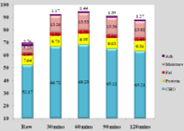Abstract
Acute diarrhoea is defined as three or more loose bowel movements in 24 hours (WHO, 1995), and is one of the principal causes of morbidity and mortality among the children. World-wide attention in the proper management of diarrheal disease in infants has led to the provision of the WHO/UNICEF glucose-based oral rehydration solution. However, this solution is only available in hospitals and health care centres which are sparsely located in most rural areas of the developing countries. Te addition of alternative is the cereal-based oral rehydration solution, which is effective in replacing the lost fluid; contribute to the nutrient intake of the patients, easily available, cheap, and familiar and more acceptable. In this present study attempt to formulate millet-based diarrheal replacement fluids and analyse the physiochemical characteristic of the fluids and correlate the foxtail and kodo millet nutrient, viscosity and Osmolality of the fluids. Among the results, there was a significant difference between unsoaked and soaked samples. The viscosity and osmolality values were reduced in soaked samples. The reduction of viscosity and Osmolality values were influenced by the soaking of millets. It was observed that, between the nutrient and viscosity of foxtail and kodo millet had a significant positive correlation in the viscosity of protein, and fat at 0.01% level. A significant positive correlation found between Osmolality and CHO at 0.01%level. Reduced Osmolality of fluids contains a minimized amount of glucose and minerals had a beneficial effect of the clinical course of diarrhoea and millet is safe for diarrheal replacement fluids. So it can be suggested that soaked millet-based replacement fluids will improve rehydration and reduce stool output due to the reduced Osmolality.
Full text article
Authors

This work is licensed under a Creative Commons Attribution-NonCommercial-NoDerivatives 4.0 International License.

